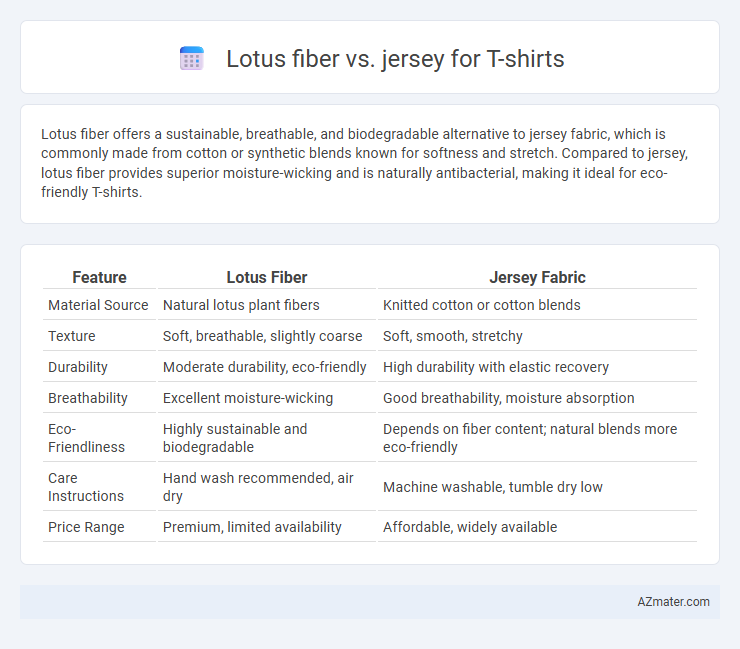Lotus fiber offers a sustainable, breathable, and biodegradable alternative to jersey fabric, which is commonly made from cotton or synthetic blends known for softness and stretch. Compared to jersey, lotus fiber provides superior moisture-wicking and is naturally antibacterial, making it ideal for eco-friendly T-shirts.
Table of Comparison
| Feature | Lotus Fiber | Jersey Fabric |
|---|---|---|
| Material Source | Natural lotus plant fibers | Knitted cotton or cotton blends |
| Texture | Soft, breathable, slightly coarse | Soft, smooth, stretchy |
| Durability | Moderate durability, eco-friendly | High durability with elastic recovery |
| Breathability | Excellent moisture-wicking | Good breathability, moisture absorption |
| Eco-Friendliness | Highly sustainable and biodegradable | Depends on fiber content; natural blends more eco-friendly |
| Care Instructions | Hand wash recommended, air dry | Machine washable, tumble dry low |
| Price Range | Premium, limited availability | Affordable, widely available |
Introduction to Lotus Fiber and Jersey
Lotus fiber is a sustainable natural material derived from the stems of lotus plants, prized for its lightweight, breathable, and eco-friendly properties, making it ideal for premium T-shirts. Jersey fabric, typically made from cotton or synthetic blends, is known for its soft texture, stretchability, and durability, offering comfort and ease of movement in casual T-shirt wear. Both materials provide unique benefits, with lotus fiber emphasizing sustainability and luxury, while jersey focuses on versatility and practicality.
Origin and Production Processes
Lotus fiber, derived from the stems of lotus plants predominantly found in Myanmar and Thailand, undergoes a meticulous hand-harvesting and extraction process involving retting, drying, and beating to produce a rare, eco-friendly textile. Jersey fabric, originating from the island of Jersey in the English Channel, is made from knitted cotton or synthetic fibers through mechanized, mass-production methods that offer high stretchability and comfort. While lotus fiber production emphasizes sustainability and artisanal techniques, jersey manufacturing prioritizes efficiency and versatility in modern textile industries.
Environmental Impact Comparison
Lotus fiber production boasts a significantly lower environmental impact compared to traditional jersey fabric made from cotton or synthetic blends, as it requires minimal water, pesticides, and chemical treatments. Jersey fabrics, especially those derived from conventional cotton, contribute to high water consumption and pesticide use, leading to soil degradation and pollution. Choosing lotus fiber T-shirts supports sustainable fashion by reducing resource depletion and promoting biodegradable material use.
Comfort and Breathability
Lotus fiber offers superior breathability due to its natural hollow structure, allowing enhanced air circulation and moisture-wicking properties that keep the wearer cool and dry. Jersey fabric, typically made from cotton or synthetic blends, provides stretch and softness but can retain heat and moisture more than lotus fiber. The lightweight and textured composition of lotus fiber ensures greater comfort in warm climates, making it a preferred choice for breathable T-shirts.
Durability and Longevity
Lotus fiber T-shirts offer exceptional durability due to their natural resistance to wear and tear, making them ideal for long-term use. Jersey fabric, typically made from cotton or synthetic blends, provides a soft, stretchy feel but tends to show signs of pilling and fabric thinning after repeated washes. For longevity, lotus fiber garments maintain structural integrity and color retention significantly better compared to standard jersey T-shirts.
Moisture-Wicking Properties
Lotus fiber offers superior moisture-wicking properties compared to traditional jersey fabric due to its natural hollow microstructure, which facilitates efficient sweat absorption and quick drying. Jersey, typically made from cotton or synthetic blends, tends to retain moisture longer, leading to discomfort during intense physical activities. Choosing Lotus fiber for T-shirts ensures enhanced breathability and better moisture management, ideal for activewear and hot climates.
Texture and Aesthetic Appeal
Lotus fiber offers a unique, natural texture with a slightly coarse but breathable feel, giving T-shirts a rustic and eco-friendly aesthetic that appeals to sustainable fashion enthusiasts. Jersey fabric, known for its smooth, soft, and stretchy qualities, provides a sleek and comfortable fit with a polished look suitable for casual or athletic wear. The contrast between lotus fiber's earthy texture and jersey's refined smoothness makes each ideal for different style preferences and occasions.
Cost and Market Availability
Lotus fiber T-shirts typically have a higher cost due to the labor-intensive extraction process and limited production scale, making them less accessible in the mainstream market. Jersey fabric, widely produced from cotton or blends, offers lower manufacturing costs and high availability, dominating the T-shirt market globally. Consumers seeking sustainable or luxury options may opt for lotus fiber despite its premium price and limited retail presence.
Suitability for Sensitive Skin
Lotus fiber offers exceptional breathability and natural hypoallergenic properties, making it ideal for T-shirts worn by individuals with sensitive skin. Jersey fabric, typically made from cotton or synthetic blends, provides softness but may sometimes cause irritation due to less breathability or chemical treatments. Choosing Lotus fiber ensures moisture-wicking and antibacterial benefits that reduce skin irritation and enhance comfort for those prone to allergies.
Final Verdict: Which T-shirt Material Wins?
Lotus fiber offers exceptional breathability, natural moisture-wicking, and eco-friendly benefits, making it ideal for sustainable fashion enthusiasts seeking comfort in hot climates. Jersey fabric excels in softness, stretchability, and durability, providing a versatile and affordable option for everyday wear. The final verdict depends on priorities: choose lotus fiber for premium sustainability and natural performance or jersey for practicality and ease of care.

Infographic: Lotus fiber vs Jersey for T-shirt
 azmater.com
azmater.com